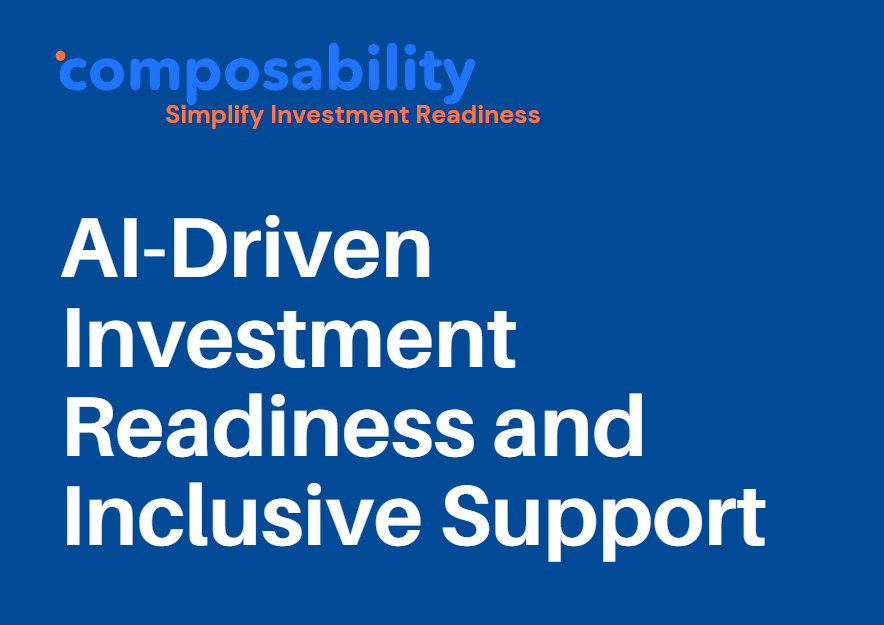by David Lewis
•
9 September 2024
The Go-to-Market (GTM) stage is a crucial phase in the investment journey for start-ups. This stage involves the core activities required to launch a new product or service into the market, including developing effective delivery models and marketing tactics. For new start-ups, it is essential to proactively develop a GTM strategy, as this stage introduces a range of dynamic challenges to develop a solid market presence. Consequently, a GTM strategy must be continuously tested, refined, and adapted over time. A clear Go-to-Market strategy provides a defined path, outlining objectives and identifying areas that may need ongoing adjustments. It serves as a roadmap to guide strategic decisions, ensuring the organisation remains focused on its goals while remaining flexible enough to pivot when necessary. Since early 2024, Cambridge Management Consulting and composability have partnered to leverage their extensive experience in supporting start-ups. Cambridge MC, originally founded with a focus on the Cambridge start-up ecosystem, has since expanded its services globally. composability is an advisory company dedicated to empowering tech startups, especially underrepresented founders, to secure investment and scale successfully. Drawing on insights from both organisations, we have identified the key components of a GTM strategy that are essential for start-ups throughout their investment journey. “The Go-to-Market is the cornerstone of any new company, and it just becomes more important as you go through raising larger rounds.” - Ian Jarvis, CEO of composability 6 Key Components of your GTM Strategy The following are 6 key elements of a GTM strategy: Define the Unique Value Proposition (UVP) of the product “Articulate clearly the unique value that you deliver.” As a start-up brings its product to market, defining the Unique Value Proposition (UVP) is essential. The UVP highlights what sets your product or service apart and why it is valuable to customers. Without a clear UVP, potential customers have little reason to consider your offering over existing alternatives. Understanding your unique strengths and integrating them into your strategy, marketing, and investor pitches is crucial to stand out in a competitive market. Cambridge Management Consulting and composability help start-ups articulate a compelling UVP during their investment readiness assessments and due diligence stages. These assessments also involve analysing competitors and comparable companies to emphasise your product’s differentiation, ensuring that your UVP is clearly defined and communicated. Research the Addressable Market “Market Research is key.” Your start-up should continuously research its addressable market to deepen its understanding of the customers it aims to serve. The addressable market includes every potential customer whose needs are met by your product. Regular research allows your business to stay informed about market trends and evolving customer expectations, ensuring your product remains relevant. Cambridge Management Consulting and composability support start-ups by helping them build detailed profiles of their target customers, uncovering insights into their needs and preferences. This valuable information can be used to refine your Go-to-Market (GTM) strategy, such as adjusting your commercial model or redefining how you present your Unique Value Proposition (UVP) to maximise appeal to your target audience. Product Delivery “What is the commercial model that underpins the service?” Your start-up must carefully choose how its products or services are delivered, which includes deciding on the commercial model, price point, and distribution channels. For example, will your product be offered on a subscription basis or through a one-time fee? Will it be sold directly through an eCommerce platform or via partners? Selecting the right delivery method involves more than just considering costs and revenue; it also requires a strategic approach that aligns with your ideal customer profile, ensures scalability, and provides a repeatable method for customer acquisition. Cambridge Management Consulting and composability support start-ups in refining their pricing strategies and market approach by analysing key financial elements, such as customer acquisition costs, profit margins, and burn rate. This process helps develop a financial plan that aligns with your overall Go-to-Market strategy, ensuring the chosen delivery model is sustainable and strategically sound Identify competitors and comparable players “Find as many comparable companies as you can to understand why you are different.” Your Go-to-Market strategy should be shaped by a thorough understanding of your competitors and comparable players in the market. Competitors significantly influence market dynamics, and aligning your strategy with these realities is essential. Conducting due diligence and competitive research allows your start-up to benchmark its GTM approach against others, helping you assess its potential effectiveness and identify potential risks. A common mistake among start-ups is claiming they have no competitors. It’s crucial to broaden your perspective to include indirect competitors, fringe market players, or providers that offer alternative solutions to the needs your product addresses. We recommend that start-ups compile a list of at least 20-30 competitors or comparable players. This comprehensive analysis not only aids in refining your Unique Value Proposition but also demonstrates to investors that you have a deep understanding of your addressable market and your positioning within it. Develop a Marketing Strategy “There is an overcommitment to driving traffic early when you are still trying to figure out your SEO strategy, your key words, your target customer etc.” “Build it, and they won’t necessarily come.” Developing the right marketing strategy for your addressable market—and within your budget—is crucial. A key objective is to communicate your product’s Unique Value Proposition effectively, which involves selecting the most suitable marketing channels. Depending on your target audience, this might mean leveraging a social media campaign, forming strategic partnerships, or exploring other tailored approaches. A common pitfall for start-ups is overinvesting in marketing without fully understanding potential customer behaviour. For instance, investing heavily in Search Engine Optimisation (SEO) to drive website traffic without knowing what type of traffic converts into sales can lead to wasted resources. Therefore, aligning your marketing strategy with the broader Go-to-Market plan is essential. Begin with a ‘learning’ and ‘testing’ phase to deepen your understanding of the market and customer expectations before scaling efforts. Cambridge Management Consulting and composability offer sales and marketing expertise to guide you through these critical strategy elements. Our experts provide advice on optimising marketing channels, brand development, tone of voice, pitch decks, SEO, and both paid and organic campaigns, as well as lead-generation tactics. This holistic approach ensures your marketing efforts are effectively integrated with your overall GTM strategy. Feed Pitch Deck “Articulate a narrative from a market perspective.” Your Go-to-Market strategy should play a pivotal role in shaping the pitch deck you present to investors. It is important to craft a narrative that illustrates how you developed and refined your strategy, demonstrating your start-up’s ability to adapt, learn, and respond to market dynamics. For instance, highlight how market research guided the creation of an ideal customer profile as part of your GTM strategy and how this insight led to adjustments in your marketing tactics to better capture your target audience. Use your GTM strategy to tell a compelling story supported by relevant data points that showcase your start-up’s value proposition and growth potential. Cambridge Management Consulting and composability offer a unique combination of expertise to support start-ups in achieving investor readiness. composability offers a platform for tech startups to showcase profiles and video pitches, enabling startups to present team, products, and services to attract investors efficiently. Three Key Characteristics of a Strong GTM Plan: Executability, Measurability and Repeatability When developing a Go-to-Market (GTM) strategy, start-ups should focus on three key elements: executability, measurability, and repeatability. The importance of these elements shifts across different funding stages, as we explore in more detail below. Executability An executable Go-to-Market (GTM) strategy is crucial for start-ups at the seed stage, as it assures investors that their capital will be used effectively to achieve practical results. To demonstrate that your GTM strategy is executable, highlight your expertise in the relevant market. This can be achieved by showcasing a credible, talented, and knowledgeable team that instills confidence in your investors. Measurability A measurable Go-to-Market (GTM) strategy is crucial at the seed stage because it demonstrates to investors that your start-up is committed to an informed, data-driven approach. By measuring your GTM strategy, you can test specific elements, make adjustments, and optimise your approach—an agile process that minimises risk and enhances decision-making. While other factors like repeatability are valuable, they are less critical at the seed stage, as investors understand that your GTM strategy is still evolving. At this stage, the focus is on learning about the market and refining your approach rather than having a fully mature strategy. Repeatability An important final element of your Go-to-Market (GTM) strategy is repeatability. A repeatable GTM strategy is one that can be consistently applied to capture customers and drive growth. This element becomes particularly critical for scaling start-ups, where investors have higher expectations regarding the maturity and effectiveness of your GTM approach. “As a scaling start-up, your Go-To-Market has to be fairly established. Everyone expects you to know your addressable market, your ideal customer, your commercial model. You should be able to demonstrate that you have converted a number of customers in a repeatable fashion.” - Ian Jarvis, CEO of composability Using a repeatable GTM strategy, investors can be confident that your start-up has found its place in the market, that it will be able to grow revenue and possibly develop further products or services that can be taken to market. Cambridge MC & composability: Empowering Start-ups on their Path to Success Cambridge Management Consulting , in partnership with composability, offers unparalleled support to start-ups embarking on their investment journey. With over 175 senior consultants across 22 countries, Cambridge MC provides global expertise in technology, helping start-ups overcome people, process, and digital technology challenges. composability offers a comprehensive, AI-powered solution designed to help tech start-ups become investment-ready and connect with the right investors. Key Benefits of the Partnership: Industry Expertise : Consultation from senior executives with extensive first-hand experience in both private and public sectors Investment Readiness Program : Assessment of the key elements for investment readiness and improvement supported by experts AI-Driven Investor Start-Up Matchmaking : Developing start-up-investor connections using AI technology based on industry, stage, and business focus Global Reach : Connection with a global network spanning major cities and innovation hubs such as Cambridge, London, New York, Paris, Tel Aviv, Dubai, Singapore, and Helsinki Channel Distribution : Use of Cambridge Connect, which is part of the Cambridge MC family of companies, and which is a leading Technology Services Distributor (TSD) with a global presence, specialising in the EMEA market Tailored Solutions : Customised strategies that address specific needs and market conditions unique to each start-up Enhanced Credibility : Demonstrable partnership with an established market leader, which can instil confidence in potential investors Fractional Leaders : Access to seasoned executive technology leaders who can fulfil a critical CxO role in a fractional capacity and at a fractional cost, enhancing your technological capabilities This combined service ensures that start-ups are not only equipped with a robust GTM strategy, but also gain the critical insights needed to navigate the complexities of early-stage investment. Through strategic guidance and practical solutions, Cambridge MC and composability help start-ups achieve sustainable growth and long-term success.


























